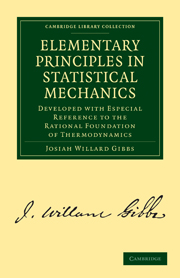 Elementary Principles in Statistical Mechanics
Elementary Principles in Statistical Mechanics Book contents
- Frontmatter
- PREFACE
- Contents
- ELEMENTARY PRINCIPLES IN STATISTICAL MECHANICS
- CHAPTER I GENERAL NOTIONS. THE PRINCIPLE OF CONSERVATION OF EXTENSION-IN-PHASE
- CHAPTER II APPLICATION OF THE PRINCIPLE OF CONSERVATION OF EXTENSION-IN-PHASE TO THE THEORY OF ERRORS
- CHAPTER III APPLICATION OF THE PRINCIPLE OF CONSERVATION OF EXTENSION-IN-PHASE TO THE INTEGRATION OF THE DIFFERENTIAL EQUATIONS OF MOTION
- CHAPTER IV ON THE DISTRIBUTION-IN-PHASE CALLED CANONICAL, IN WHICH THE INDEX OF PROBABILITY IS A LINEAR FUNCTION OF THE ENERGY
- CHAPTER V AVERAGE VALUES IN A CANONICAL ENSEMBLE OF SYSTEMS
- CHAPTER VI EXTENSION-IN-CONFIGURATION AND EXTENSION-IN-VELOCITY
- CHAPTER VII FARTHER DISCUSSION OF AVERAGES IN A CANONICAL ENSEMBLE OF SYSTEMS
- CHAPTER VIII ON CERTAIN IMPORTANT FUNCTIONS OF THE ENERGIES OF A SYSTEM
- CHAPTER IX THE FUNCTION ϕ AND THE CANONICAL DISTRIBUTION
- CHAPTER X ON A DISTRIBUTION IN PHASE CALLED MICROCANONICAL IN WHICH ALL THE SYSTEMS HAVE THE SAME ENERGY
- CHAPTER XI MAXIMUM AND MINIMUM PROPERTIES OF VARIOUS DISTRIBUTIONS IN PHASE
- CHAPTER XII ON THE MOTION OF SYSTEMS AND ENSEMBLES OF SYSTEMS THROUGH LONG PERIODS OF TIME
- CHAPTER XIII EFFECT OF VARIOUS PROCESSES ON AN ENSEMBLE OF SYSTEMS
- CHAPTER XIV DISCUSSION OF THERMODYNAMIC ANALOGIES
CHAPTER X - ON A DISTRIBUTION IN PHASE CALLED MICROCANONICAL IN WHICH ALL THE SYSTEMS HAVE THE SAME ENERGY
Published online by Cambridge University Press: 05 August 2011
- Frontmatter
- PREFACE
- Contents
- ELEMENTARY PRINCIPLES IN STATISTICAL MECHANICS
- CHAPTER I GENERAL NOTIONS. THE PRINCIPLE OF CONSERVATION OF EXTENSION-IN-PHASE
- CHAPTER II APPLICATION OF THE PRINCIPLE OF CONSERVATION OF EXTENSION-IN-PHASE TO THE THEORY OF ERRORS
- CHAPTER III APPLICATION OF THE PRINCIPLE OF CONSERVATION OF EXTENSION-IN-PHASE TO THE INTEGRATION OF THE DIFFERENTIAL EQUATIONS OF MOTION
- CHAPTER IV ON THE DISTRIBUTION-IN-PHASE CALLED CANONICAL, IN WHICH THE INDEX OF PROBABILITY IS A LINEAR FUNCTION OF THE ENERGY
- CHAPTER V AVERAGE VALUES IN A CANONICAL ENSEMBLE OF SYSTEMS
- CHAPTER VI EXTENSION-IN-CONFIGURATION AND EXTENSION-IN-VELOCITY
- CHAPTER VII FARTHER DISCUSSION OF AVERAGES IN A CANONICAL ENSEMBLE OF SYSTEMS
- CHAPTER VIII ON CERTAIN IMPORTANT FUNCTIONS OF THE ENERGIES OF A SYSTEM
- CHAPTER IX THE FUNCTION ϕ AND THE CANONICAL DISTRIBUTION
- CHAPTER X ON A DISTRIBUTION IN PHASE CALLED MICROCANONICAL IN WHICH ALL THE SYSTEMS HAVE THE SAME ENERGY
- CHAPTER XI MAXIMUM AND MINIMUM PROPERTIES OF VARIOUS DISTRIBUTIONS IN PHASE
- CHAPTER XII ON THE MOTION OF SYSTEMS AND ENSEMBLES OF SYSTEMS THROUGH LONG PERIODS OF TIME
- CHAPTER XIII EFFECT OF VARIOUS PROCESSES ON AN ENSEMBLE OF SYSTEMS
- CHAPTER XIV DISCUSSION OF THERMODYNAMIC ANALOGIES
Summary
An important case of statistical equilibrium is that in which all systems of the ensemble have the same energy. We may arrive at the notion of a distribution which will satisfy the necessary conditions by the following process. We may suppose that an ensemble is distributed with a uniform density-in-phase between two limiting values of the energy, ∈′ and ∈″, and with density zero outside of those limits. Such an ensemble is evidently in statistical equilibrium according to the criterion in Chapter IV, since the density-in-phase may be regarded as a function of the energy. By diminishing the difference of ∈′ and ∈″, we may diminish the differences of energy in the ensemble. The limit of this process gives us a permanent distribution in which the energy is constant.
We should arrive at the same result, if we should make the density any function of the energy between the limits ∈′ and ∈″, and zero outside of those limits. Thus, the limiting distribution obtained from the part of a canonical ensemble between two limits of energy, when the difference of the limiting energies is indefinitely diminished, is independent of the modulus, being determined entirely by the energy, and is identical with the limiting distribution obtained from a uniform density between limits of energy approaching the same value.
We shall call the limiting distribution at which we arrive by this process microcanonical.
- Type
- Chapter
- Information
- Elementary Principles in Statistical MechanicsDeveloped with Especial Reference to the Rational Foundation of Thermodynamics, pp. 115 - 128Publisher: Cambridge University PressPrint publication year: 2010First published in: 1902


